The specter of nuclear conflict haunts several regions across the globe, posing existential threats to international peace and security. In 2011 Global Zero, a group working for a nuclear weapon-free world, identified four potential nuclear flashpoints that could trigger catastrophic consequences: the Korean Peninsula, the Taiwan Strait, Ukraine, and South Asia. Each of these regions is marked by deep-seated historical conflicts, strategic rivalries, and political complexities that make them particularly susceptible to nuclear escalation.
The Korean Peninsula, with its long-standing division between North and South Korea, remains one of the most militarized borders in the world. North Korea’s nuclear ambitions and periodic provocations exacerbate tensions, creating a precarious balance that could easily tip into conflict. The Taiwan Strait is another critical hotspot, where the geopolitical contest between China and Taiwan, backed by the United States, raises the stakes for regional security. China’s growing military capabilities and its resolve to reunify Taiwan, and US involvement in China’s backyard threaten to spark a broader confrontation. In Europe, Ukraine stands as a stark reminder of the Cold War’s lingering legacy. The annexation of Crimea by Russia and the ongoing conflict in Ukraine has not only destabilized the region but also revived fears of a nuclear-tinged standoff between NATO and Russia.
Among these volatile regions, South Asia presents a unique and persistent danger. The enduring rivalry between India and Pakistan, both nuclear-armed nations, centers on the contentious region of Kashmir. This unresolved dispute remains the most likely trigger for a nuclear exchange in the region. South Asia’s nuclear landscape was dramatically altered on May 28, 1998, when Pakistan conducted its nuclear tests in response to India’s tests earlier that month. This day marked a significant turning point, embedding nuclear capabilities deep within the region’s strategic calculus. The rivalry between India and Pakistan, centered on the Kashmir issue, now carries the ominous shadow of a nuclear dimension.
Kashmir, often described as the “unfinished business of partition,” remains the only major territorial dispute between two nuclear-armed neighbors. The conflict has its roots in the partition of British India in 1947, which led to the creation of India and Pakistan. The princely state of Jammu and Kashmir became a focal point of contention, with both countries claiming it in its entirety but administering different parts of it. The strategic importance of Kashmir cannot be unheeded. It is not only a symbol of national identity for both India and Pakistan but also a region of significant geopolitical interest. The mountainous terrain and the Siachen Glacier hold military importance, and the rivers originating from Kashmir are vital for agriculture and power generation in both countries.
Given this backdrop, the Kashmir conflict remains a potent trigger for potential nuclear exchange. The region has witnessed numerous military standoffs, including the 1999 Kargil War and the 2019 Pulwama-Balakot crisis, both of which brought India and Pakistan perilously close to a full-scale war. The presence of nuclear weapons adds a dangerous layer to these confrontations, making the stakes higher and the potential for escalation much more severe.
India’s nuclear tests on May 11 and 13, 1998, were a significant strategic move that sent shockwaves through the region. These tests were perceived in Pakistan as a direct threat to its security. In a statement to the United Nations, the Pakistani representative articulated these concerns, stating that India’s tests “affirmed that it had the ‘big bomb’ and [that India] threatened Pakistan with the use of nuclear weapons and held out a threat of nuclear blackmail to impose a military solution in Kashmir.”Pakistan viewed India’s nuclear tests not only as a demonstration of military prowess but also as a form of nuclear coercion. The tests were seen as an attempt by India to shift the strategic balance in its favor, potentially undermining Pakistan’s security and sovereignty. This perception left Pakistan with little choice but to respond in kind to restore the strategic equilibrium.
On May 28, 1998, Pakistan conducted its own nuclear tests, signaling its capability and resolve to counter any nuclear threat from India. These tests were a clear message to India and the world that Pakistan would not be intimidated or coerced into submission. By achieving nuclear parity with India, Pakistan aimed to deter any potential aggression and secure its position in the regional power dynamics.
The international community has long recognized the volatility of the Kashmir issue. Various attempts at mediation and conflict resolution have been made, yet the dispute remains unresolved. The recent abrogation of Article 370 by the Indian government, which granted special autonomy to Jammu and Kashmir, has further intensified tensions, leading to an even more precarious situation.
The significance of May 28 in this narrative cannot be overlooked. Pakistan’s decision to test its nuclear weapons was a direct response to India’s tests, a move that solidified the nuclear deterrence dynamic in South Asia. This day serves as a reminder of the fragile peace that exists in the region, a peace held together by the thin thread of mutually assured destruction.
As we contemplate the stakes, the haunting words of J. Robert Oppenheimer after the first nuclear test, codenamed “Trinity,” resonate profoundly: “We knew the world would not be the same. A few people laughed, a few people cried, but most people were silent. I remembered the line from Hindu scripture, the Bhagavad-Gita: ‘Now I am become Death, the destroyer of worlds.'” The strategic calculus in South Asia must therefore prioritize the resolution of the Kashmir conflict. Without addressing the root cause of Indo-Pak tensions, the region will continue to teeter on the edge of nuclear catastrophe. Confidence-building measures, dialogue, and international mediation are essential to diffusing this flashpoint.

